
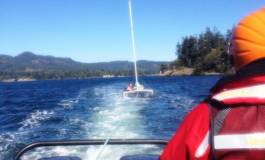
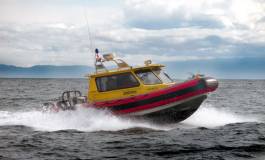
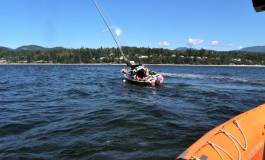
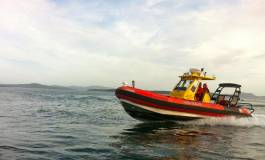
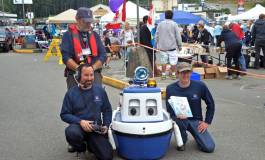
Restricted Operators Certificate (Marine)
Training materials for teaching radio procedures. A selection of call recordings courtesy of Station 35.
-

 Auxiliary Training CallsWhenever we depart or return to base we advise Coast Guard Radio, who in turn inform Rescue Coordination Centre so that RCC knows where we are. In this recording you can hear an Auxiliary unit contact Coast Guard Radio on Channel 04A. This recording also captures the followup conversation between the controller and RCC over a dedicated phone line as he relays the Auxiliary units information.
Auxiliary Training CallsWhenever we depart or return to base we advise Coast Guard Radio, who in turn inform Rescue Coordination Centre so that RCC knows where we are. In this recording you can hear an Auxiliary unit contact Coast Guard Radio on Channel 04A. This recording also captures the followup conversation between the controller and RCC over a dedicated phone line as he relays the Auxiliary units information.
-

 Isabella Scott IncidentTHIS IS A LARGE FILE 25.4Mb
Isabella Scott IncidentTHIS IS A LARGE FILE 25.4Mb
This recording is long and at times dull - just like some of our calls. However it follows an incident from the initial call from the gillnetter Isabella Scott to its conclusion when an Auxiliary unit brings the vessel safely into harbour. Its a good example of effective communication between various players, including the fishing boat skipper, Coast Guard Radio, Victoria Traffic, Rescue Coordination Centre, a commercial assistance provider, a nearby navy vessel (Orca 55) and an Auxiliary unit that was tasked to assist.
After the vessel calls for assistance, Coast Guard Radio issues a Marine Assistance Broadcast to determine if any vessels in the area can assist. Note that a SAR vessel is not immediately tasked.
This contains the "landline" communications between Coast Guard Radio and RCC. At all times RCC is aware of whats taking place on the water, including the on-scene weather, thanks to good communications between the vessels, the controller, and RCC. At times RCC speaks directly with the skipper of the Isabella Scott, however often an Auxiliary unit is the sole source of on-scene information.
When the navy vessel Orca 55 offers assistance, RCC notes their availability but makes it clear that the ship is not "tasked". A tasking is an official assignment from RCC, and for the Auxiliary it triggers certain responsibilities and subsequent compensation to the unit. While we would not wait for a tasking before assisting a vessel in serious trouble, we normally await a formal tasking before taking action.
While one MCTS officer coordinates the incident, his partner at the Traffic desk monitors the Isabella Scott on radar, advising other vessels such as ferries about the hazard, and later providing a "vector" (range and bearing) to help the assisting vessel to the correct position.
When the Auxiliary unit is tasked to help with the tow, they immediately confirm the working radio channel and take time to communicate with the naval vessel about how the handover will take place. They have Stopped, Assessed, and Planned.
-

 Mayday Relay CallThis is the most serious distress call. In this case MCTS is broadcasting a "Mayday Relay", forwarding to all mariners the information it has received about a vessel in trouble.
Mayday Relay CallThis is the most serious distress call. In this case MCTS is broadcasting a "Mayday Relay", forwarding to all mariners the information it has received about a vessel in trouble.
The transmission begins with the mayday alarm tone.
Despite the urgency of the situation, the MCTS sounds calm and presents the information very slowly and clearly.
-

 Pan Pan CallExample of an urgent call involving a vessel taking on water.
Pan Pan CallExample of an urgent call involving a vessel taking on water.
-

 Securite CallTwo routine calls with safety information for mariners.
Securite CallTwo routine calls with safety information for mariners.
-

 Traffic CallLarge vessels are required to participate in the Vessel Traffic Services system and monitor the local traffic working VHF channel. The MCTS traffic officer tracks vessels on radar and advises ships of other traffic in their area. While we are not required to participate, were welcome to contact the Traffic Controller at any time, for example for ship information if were operating near the traffic lanes in poor visibility.
Traffic CallLarge vessels are required to participate in the Vessel Traffic Services system and monitor the local traffic working VHF channel. The MCTS traffic officer tracks vessels on radar and advises ships of other traffic in their area. While we are not required to participate, were welcome to contact the Traffic Controller at any time, for example for ship information if were operating near the traffic lanes in poor visibility.